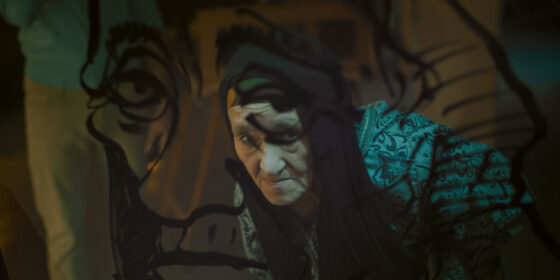TIFF 2023 | The Mother of All Lies (Asmae El Moudir, Morocco / Egypt / Saudi Arabia / Qatar) — TIFF Docs

By Michael Sicinski
The governing formal conceit for Asmae El Moudir’s feature debut would have been more impressive had Rithy Panh not beaten her to the punch ten years ago. In working to explore the gaps in her childhood memories, as well as the history of oppression in Morocco under Hassan II, El Moudir reconstructs her old neighbourhood in cardboard, plastic, and clay, populating this miniature timescape with meticulously carved figurines, representing herself and the others who were living there at the time. The Mother of All Lies does in fact expand on Panh’s The Missing Picture (2013) because El Moudir recruits her entire family, all of them taking part to some degree in this reclamation project. It’s in these fraught dynamics, and their relationship to the so-called Years of Lead, that Mother truly distinguishes itself.
Part of Asmae’s impetus for this project is the fact that there are no photographs of her childhood. In time, it is revealed that all the family photos were burned by the director’s grandmother (Zahra Jeddaoui), a small but fearsome woman who has tyrannized the family for Asmae’s whole life. Everyone is afraid of her, and it’s easy to see why. She lies to friends and says her granddaughter is a journalist because she thinks film directors are “sluts who hang out in bars.” She vehemently rejects her miniature alter ego, insisting that her son (Mohammad El Moudir), who carved many of the figurines by hand, has “deformed” her. And when the director brings in an artist to draw her for a different figurine, she destroys his work and chases him away with her cane.
As more and more pieces of El Moudir’s childhood come into focus, we discover how cruelty in the home often mirrors fascism in the larger world. Zahra, a devoted subject of Hassan II, refuses to talk about the period in late May and early June 1981, when the bread riots in Casablanca led to the slaughter of over 600 Moroccan citizens, whose bodies were stolen by soldiers and dumped in a mass grave. In one wrenching scene, Saïd Masrour, a family friend who survived incarceration, reenacts his torture at the hands of the military. But Zahra will have none of it, implying that the protestors brought it on themselves. “Hush,” she repeatedly tells Asmae, “the walls have ears.” The Mother of All Lies rebuilds those walls and allows them to speak.
Michael Sicinski

